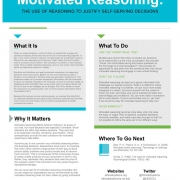Corporate Scandal, Reputation Risks and Common Sense
 When corporate scandal occurs- whether it makes headlines or not- there is a tendency to blame bad apples instead of examining the organizational culture to identify areas in need of further improvement or oversight.
When corporate scandal occurs- whether it makes headlines or not- there is a tendency to blame bad apples instead of examining the organizational culture to identify areas in need of further improvement or oversight.
In a recent piece in The Wall Street Journal, Lou Gerstner, a former chairman and CEO of IBM and RJR Nabisco, now chairman of the board of directors at the Broad Institute of MIT and Harvard, outlines why there is continued misunderstanding around culture and the various ways companies undercut their own efforts to strengthen it.
From the piece, using Wells Fargo as an example:
If the reward system pays a premium for one kind of behavior, that’s what will determine employee behavior—regardless of the words enshrined in the value statement.
If the financial-reporting system focuses entirely on short-term operating results, that’s what will get priority from employees.
Look at who gets the atta-boy and atta-girl treatment at corporate meetings. Is it the leaders in meeting financial targets—or is it those who raise concerns regarding marketing programs that give priority to corporate goals at the expense of true customer needs?
Each of these areas, compensation, short-termism and leadership recognition/strategies, can make- or break- corporate culture and ruin a reputation long after the scandal has been addressed. In fact, the smart title of the piece, “The Culture Ate Our Corporate Reputation,” reinforces the precarious nature of corporate reputations. As Warren Buffet said, “It takes 20 years to build a reputation and five minutes to ruin it.” Hence, why Ethical Systems uses the metaphor that culture should be thought of as a garden, constantly being tended and weeded to cultivate its long-term viability.
More so, the headline points to the power of culture to overpower words and policies outlined in brochures, websites and by employees in meetings. Culture, above all else, can overwhelm people’s ethical proclivities and morals and overshadows formal and informal guidelines and any efforts made at reputation management.
Parallel to this piece in The Wall Street Journal, Fast Company ran an article on How Wells Fargo’s Work Culture May Have Cleared The Way For Scandal that acutely calls out how the environment at the storied bank contributed to its recent ethics troubles. As the author cites:
“If what we hear in the media about the treatment of whistleblowers is true, Wells Fargo has a much bigger issue than the fraudulent accounts—they have a culture of fear…If this is validated, it puts to question the credibility of their leadership’s response.”
Culture is vital, which makes the support of employees paramount. Companies need to take a committed approach to actively listening, and responding to, staff concerns and reinforcing an environment of trust, leadership and long term thinking throughout the organization. Otherwise, the headlines- and profits- will reflect how this lack of investment resulted in continued ethical lapses.
Further Reading:
- The Leadership Blind Spots at Wells Fargo, Harvard Business Review, October 2016. [article]
- Corporate Culture [research page]
- Measuring Ethical Culture: Tips and Tricks [blog]
*image courtesy of Insurance and Risk Management: Knowledge Alliance









